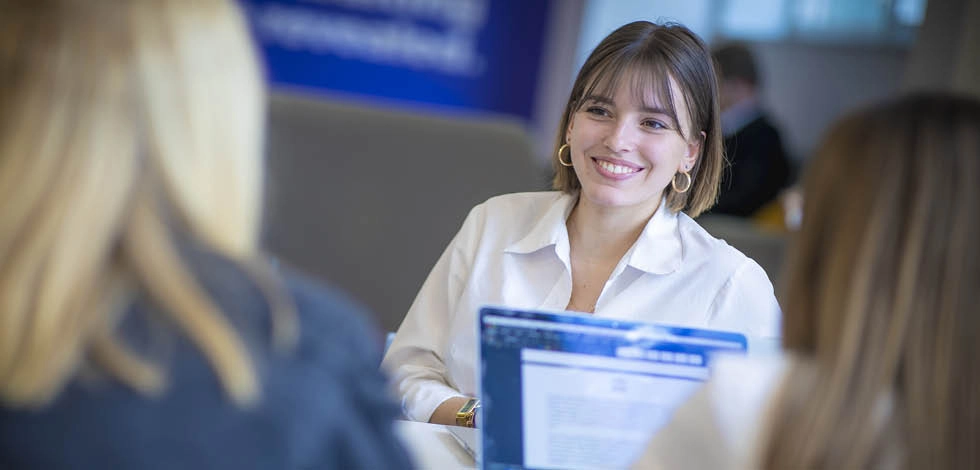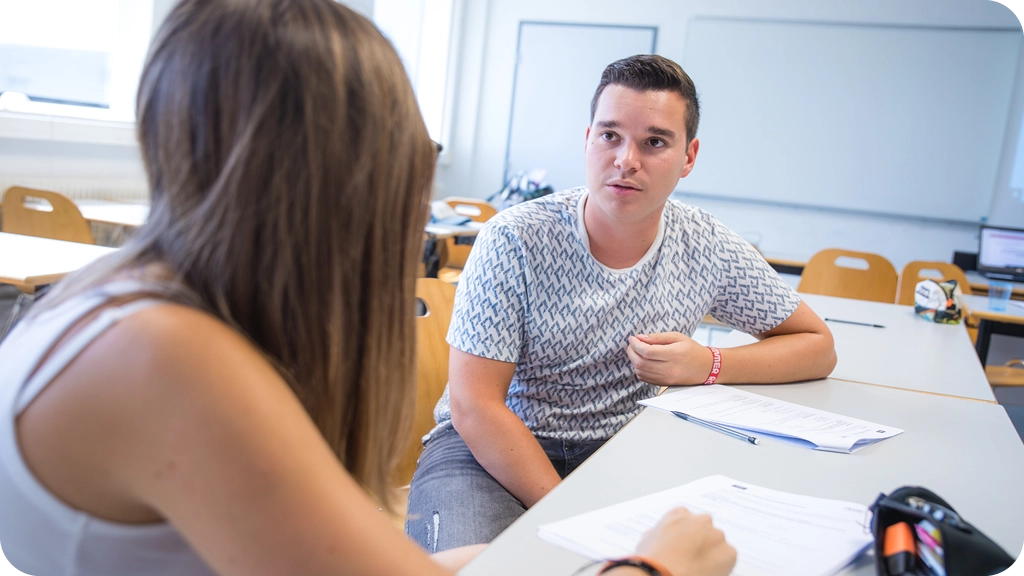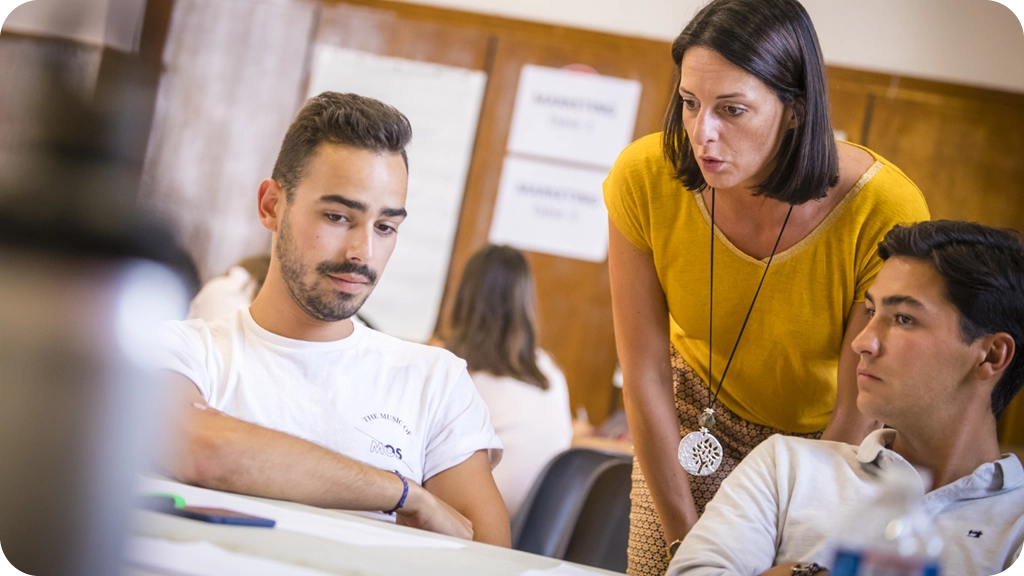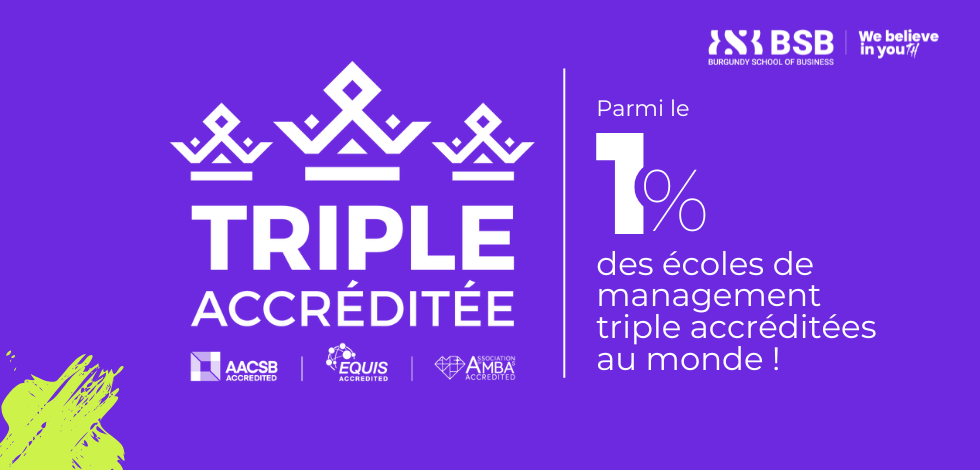30 Business School Interview Questions You Should Master

It's the moment when everything can change. After months of fine-tuning your Parcoursup file or preparing for the competitions, Business school interview stands like The last step to cross. No multiple choice questions, no essay: just you, your personality, and about thirty minutes to convince.
But what exactly are we going to ask you? And above all, How to answer it without reciting an overly formatted speech ? Spoiler: it's not an ordeal, it's an opportunity. That of stand out other than your grades.
In this article, we review The 30 most asked interview questions, classified by theme, with concrete advice to answer them like a pro... and with sincerity.
Ready to turn your doubts into clicks? It's gone.
The most asked business school interview questions
Learning to talk about yourself: background, personality, experience
1. Can you introduce yourself?
It is the most classic question of openness, but also the most tricky. Why? Because to recite your resume or lining up your ballots is not enough. What the jury is waiting for is a structured story and personal: who you are, what drives you, what brought you here.
A good approach: 1) your origins or your environment, 2) your educational background, 3) your interests or projects.
At BSB, our Pathfinder coachesTM teach students how to build an authentic and powerful pitch in 2 minutes flat.
2. What are your three main qualities?
Here, the trap is banality: “motivated, curious, dynamic”. What the jury is waiting for are real qualities, embodied by concrete examples. Are you rigorous? Talk about a project where you had to plan everything out. Are you empathetic? Tell me about a situation where you helped a friend who was in trouble.
Tip: avoid abstract lists. Prefer a quality = an anecdote.
3. And your three faults?
It's THE dreaded question... but not a punishment. The aim is not to get stuck, but to see if you you know enough to talk honestly about your areas of progress. The “perfectionist” or “overly demanding” no longer convince anyone.
Tip: talk about a real defect (shyness, tendency to disperse...), but show how you work on it. That proves maturity and lucidity.
4. What is your biggest failure?
It's not a test on the severity of the failure, but on your ability to learn from it. The jury is looking to understand how you react to a setback. Choose a concrete situation: a failed exam, a collective project that failed, a bad choice for an internship... and above all, Explain what you have learned.
Use the STAR method : Situation — Task — Action — Result.
5. What would your friends say about you?
A lighter question on the surface, but one that allows the jury to identify your social image. Here, the idea is to show that you are looking back on yourself. Mention what others like about you, but also A little touch of humor or self-deprecation maybe welcome.
6. What is the thing you are most proud of?
It's an invitation to talk about yourself... with sincerity. It is not necessarily about academic success. It can be personal commitment, surpassing oneself, taking risks. What the jury wants to hear here is what you care about.
Advice from our Pathfinder coachesTM : choose a pride that reveals your values.

Show your motivation for school and your professional project
7. Why this business school?
That is the question The most discriminating. And that's logical: if you don't have anything specific to say about school... Why choose you? Banish empty phrases (“good reputation”, “beautiful premises”) and talk about what you are really attracted to: a specialization, a campus, a pedagogical approach, an associative project.
Advice from our Pathfinder coachesTM : at BSB, we encourage our candidates to formulate their “match” with the school as if it were a thoughtful choice, not by default.
8. Why you and not someone else?
It is not an invitation to sell yourself as a product, but to express your uniqueness. In what way do your background, your personality, your projects contribute something to the promotion? Tell me about a detail that sets you apart, a trait that makes you unique... and show that you are aware of it.
9. What is your professional project?
No need to have a fixed plan. But the jury wants to see if you have a direction, a curiosity for certain jobs or sectors. Even if you change later, showing that you are projecting yourself is already showing maturity.
Examples: “I am interested in digital marketing in music”, “I am attracted to social entrepreneurship”.
10. Where do you see yourself in 10 years?
Again, this is not a prediction you are being asked for. It is a projection of your ambitions, of your vision. The idea is to see if you've thought about the impact you want to make, what kind of career or role you're attracted to.
Tip: Talk in terms of skills, work environments, sectors that inspire you.
11. What material attracts you the most?
This question seems simple, but revealing: it allows you to see If you have dug into the programs. Respond in line with your project: if you want to work in finance, it's better not to say “I like the com” (unless you combine the two well!).
12. What specialization are you interested in?
Here too, the jury wants to test your ability to anticipate. Mention a specialization, it is also showing that you have read the school's site, that you understand its curriculum and that you You can already see inside. At BSB, for example, you can cite: Wine Business, Finance and Audit, Data, Communication & Media, etc.

Test your curiosity and your vision of the world
13. What economic news are you interested in?
Frequently asked question, especially during prep interviews. Don't recite a newspaper article, but speak of a subject that questions you or are passionate about : inflation, sustainable development, AI, geopolitics, business ethics... And express your personal perspective.
14. What book impressed you?
The jury is not looking to know if you are a writer. It tests your ability to extract a message, to link a work to a personal reflection. It can be a novel, an essay, an autobiography, a professional book...
Tip: choose a book that resonates with your values or your project.
15. If you were to start a business tomorrow, what would it be?
A great classic for test your creativity and your sense of concreteness. Don't censor yourself. The idea is not to have a brilliant answer, but a realistic idea that resembles you. Describe the concept, the target, and what would motivate you to get started in a few sentences.
16. A personality that inspires you?
Steve Jobs, Simone Veil, Inoxtag, Frida Kahlo... Whatever, as long as you are able to explain why. What the jury is waiting for are your mirrored values, your ambitions, your personal battles.
17. Tell me about a project you are proud of
Here, you can leave the school environment: a podcast, an association, an organized trip, an artistic project... Show that you You are committed, that you are going to the end of things, even if the result was not perfect.
At BSB, we value initiative, audacity, and the desire to act. That's exactly the kind of thing a jury wants to hear.
Trick or creative questions
18. If you were an animal, which would you be?
Yes, it's a real question, and no, it's not a zoology test. The jury seeks to identify your ability to define yourself with distance and coherence.
Turtle for perseverance? Dolphin for communication? It doesn't matter, as long as you justify your choice with sincerity and logic.
19. What was the last mistake you made?
Here, the trap is to say “I don't make mistakes”... or, conversely, to devalue yourself too much. The objective is to see if you are able to Questioning you without destroying yourself. Talk about a concrete moment when you made a bad choice and especially what you got out of it.
The bottom line: the mistake is not the problem. The real subject is learning.
20. What school is not at all appealing to you?
A daunting question... if you lack diplomacy. The idea is not to “break” another school, but to highlight the criteria that matter to you. If an ultra-competitive school is not for you, explain that you are looking for a more collaborative environment.
Moreover, this type of response can underline your suitability with a school like BSB, which values the spirit of community.
21. What is your weak spot?
A more direct variant of faults, this question tests your ability to talk about your weaknesses without falling into the cliché. The ideal: a real weak point, but in line with the school context. Are you an introvert but are you working to open yourself up to others in your associations? It is perfect.
22. Describe yourself in one word
A simple question... but a double-edged sword. Choose a strong, personal word and above all illustrate it. “Curious”, “committed”, “resilient”, “creative”...? Very good. But why? A short story behind each word can make all the difference.
23. What is the quality that you hide best?
This question aims to destabilize, while leading you to reveal a personality trait that you don't assume much, but which is nevertheless useful. Respond with a touch of humor if you are comfortable, or with a bit introspective thinking.
Example: “I have an artistic soul but I don't always dare to show it in very structured contexts.”
That kind of response creates a real connection with the jury.

7 Unexpected Questions That Can Make a Difference
24. How do you deal with stress?
The jury does not expect you to be immune to stress, but to know recognize it and supervise it. Talk about a situation where you were put under pressure (exam, oral, competition, deadline) and explain What you have put in place : breathing, expectation, organization, routine...
Tip: Avoid phrases like “I never stress” — they sound wrong.
25. What sets you apart from other candidates?
A direct question, which requires you to Take a step back from yourself. What the jury is waiting for here is a differentiating factor : a passion, a life experience, a character trait, an atypical career... Don't answer to look pretty: go and find what Makes you unique without forcing the line.
At BSB, we value individualities to reveal everyone's potential, not uniformity. If you are different, say so.
26. What is your biggest dream?
There is no need for an ultra-concrete or revolutionary project. Talk about an ambition that inspires you, even if it seems far away. The idea is to show that you are planning yourself with Envy, meaning and imagination. It can be professional or personal, as long as it is sincere.
27. If you could have dinner with anyone (living or dead), who would you choose?
A way to test your culture, your sensitivity, your curiosity... Your answer says a lot about your values. Choose a personality you admire, and explain What you would like to ask or learn from him or her.
Pro tip: there are no right answers, but there are empty answers. Justification is what counts.
28. What did you learn about yourself this year?
A question that encourages introspection. Talk about a awareness, of a change in the way you work or communicate, or a time when you had to adapt. This can come from a failure, an internship, a collective project, or even a personal experience.
29. What is your relationship to the competition?
Life in business school is also about rankings, challenges, competitions... The jury wants to know How do you deal with the competition : like a motor? Stress? A personal challenge? Respond with honesty, explaining what it brings you (or taught you).
30. What would you like the jury to remember about you?
It's often the last question in an interview, and it can change everything. It's time to leave a positive and clear trace. You can choose a keyword that summarizes your profile, a quality, a project, or an energy that you wanted to transmit.
Council of Pathfinder coachesTM : end with a smile, an open posture and a short but striking last sentence.
How do you train effectively for the interview?
Preparing for a business school interview is not reciting a question and answer sheet. It is above all learn to tell yourself clearly, confidently, and consistently. And like any oral exercise, the more you train, the more you progress.
The good news is that you don't have to be a great speaker to convince. All you need is the right reflexes, the right tools... and a bit of method.
Speak out loud, not just in your head
We all have this tendency to believe that we “know what to say.” But until you say it out loud, you don't really know How are you going to say it. Repeating your answers orally, alone or in front of a loved one, allows you to identify:
- the flawed formulations,
- sentences that are too long,
- the times when you lack fluidity.
Even a few minutes a day is enough to gain ease and naturalness.
Film yourself (yes, really)
It's never nice to see each other again, but it's damn effective. You spot:
- your speech tics,
- your posture,
- your speech rate,
- your facial expressions.
Look at yourself without judgment, just wanting to do better. And do it again.
Use the STAR method to structure your answers
We have already talked about this above, but this method is a genuine strategic asset :
- Situation : what context were you in?
- Task : what was your objective?
- Action : what did you actually do?
- Result : what was the impact or the learning?
With her, your answers become clear, credible and impactful. Perfect for telling about a project, a failure, a personal commitment...
Focus BSB: our days and appointments to prepare your interviews
At BSB, we are not leaving you alone in the face of this crucial moment. We organize for our future bachelors, preparatory students and future masters, various events 100% dedicated to their profile to train for oral exams with our Pathfinder coachesTM. Go to our site to register for events dedicated to you. Thanks to our device PathfinderTM, you benefit from:
- group workshops for Get to know you better and identify your strengths,
- maintenance simulations in real conditions with personalized returns,
- individual coaching to work your pitch, your soft skills and your storytelling.
This tailor-made preparation allows our candidates to present yourself with authenticity, without overplaying or overdosing.
FAQ — Answers to frequently asked questions about interviewing in business school
Is the business school interview elimination?
Yes, in the majority of cases. The interview is determinant in admission, sometimes more than the notes or the file. But it is also a Great opportunity to stand out, especially if you have an atypical profile, average grades or an original background.
At BSB, for example, we consider that the personality, potential and coherence of the project matter as much as the academic record.
Can you pass your interview even if you miss a question?
Of course. What juries expect is not perfection, but sincerity and the ability to bounce back. If you get confused, stay calm. You can even say, “Can I rephrase my answer?” — it's a sign of composure, not weakness.
What if I don't understand a question?
Just ask for it to be reformulated for you. No serious jury will punish you for that. On the contrary, it shows that you prefer To understand rather than to answer on the side.
Do I have to prepare all possible questions?
It is impossible to anticipate everything. But if you you are trained on the 30 questions proposed in this article, you will have covered the essentials. And above all, you will have learned to Talk about yourself fluently, which will help you even with unexpected questions.
How do I know if I was good during the interview?
Trust your feelings: were you comfortable? Sincere? Were you able to get your ideas across? Sometimes, you leave an interview saying “I forgot that” or “I could have said that better”... and yet, you are admitted. The accuracy of an interview does not depend on every word, but to the general impression left.





To remember